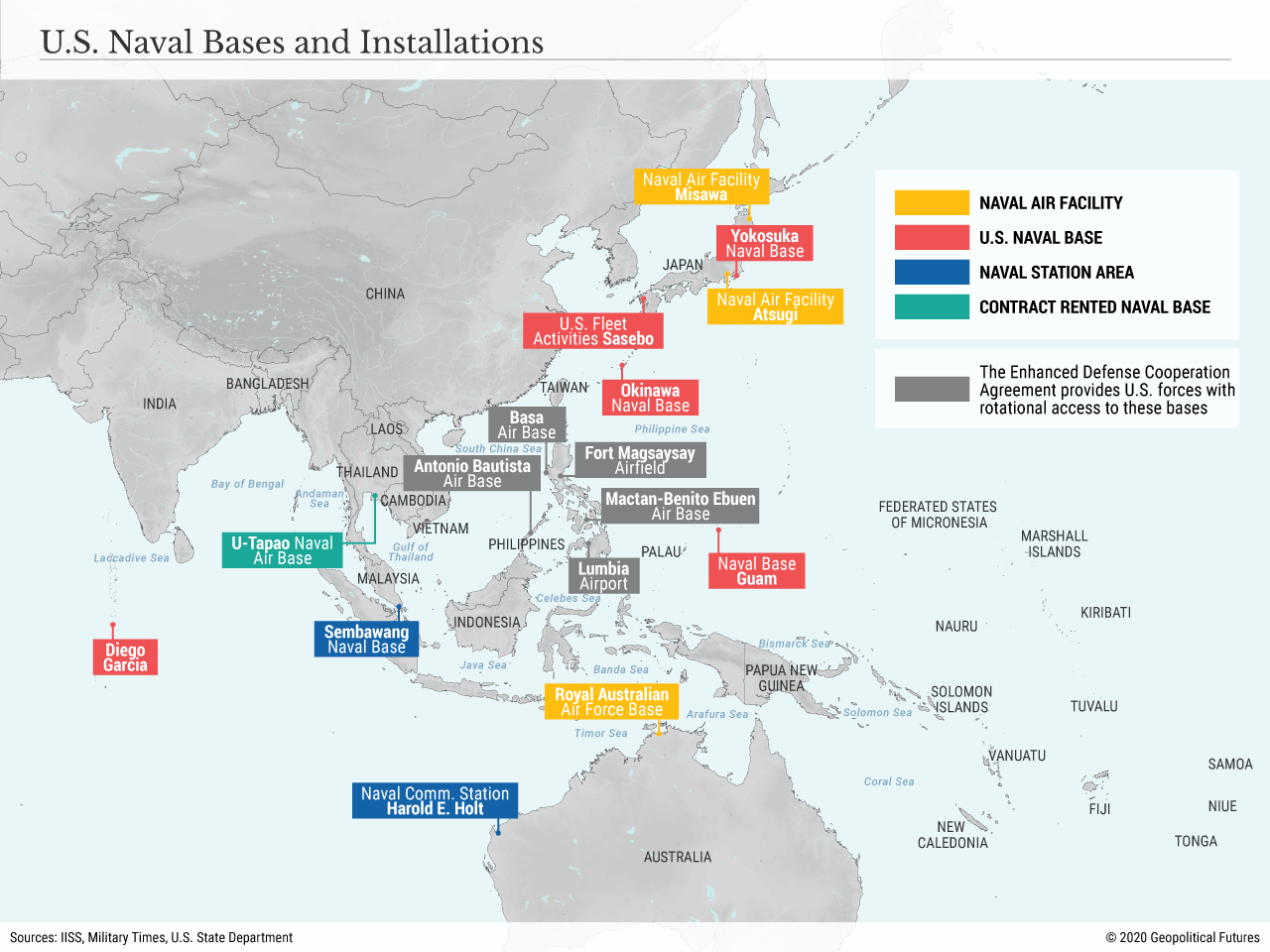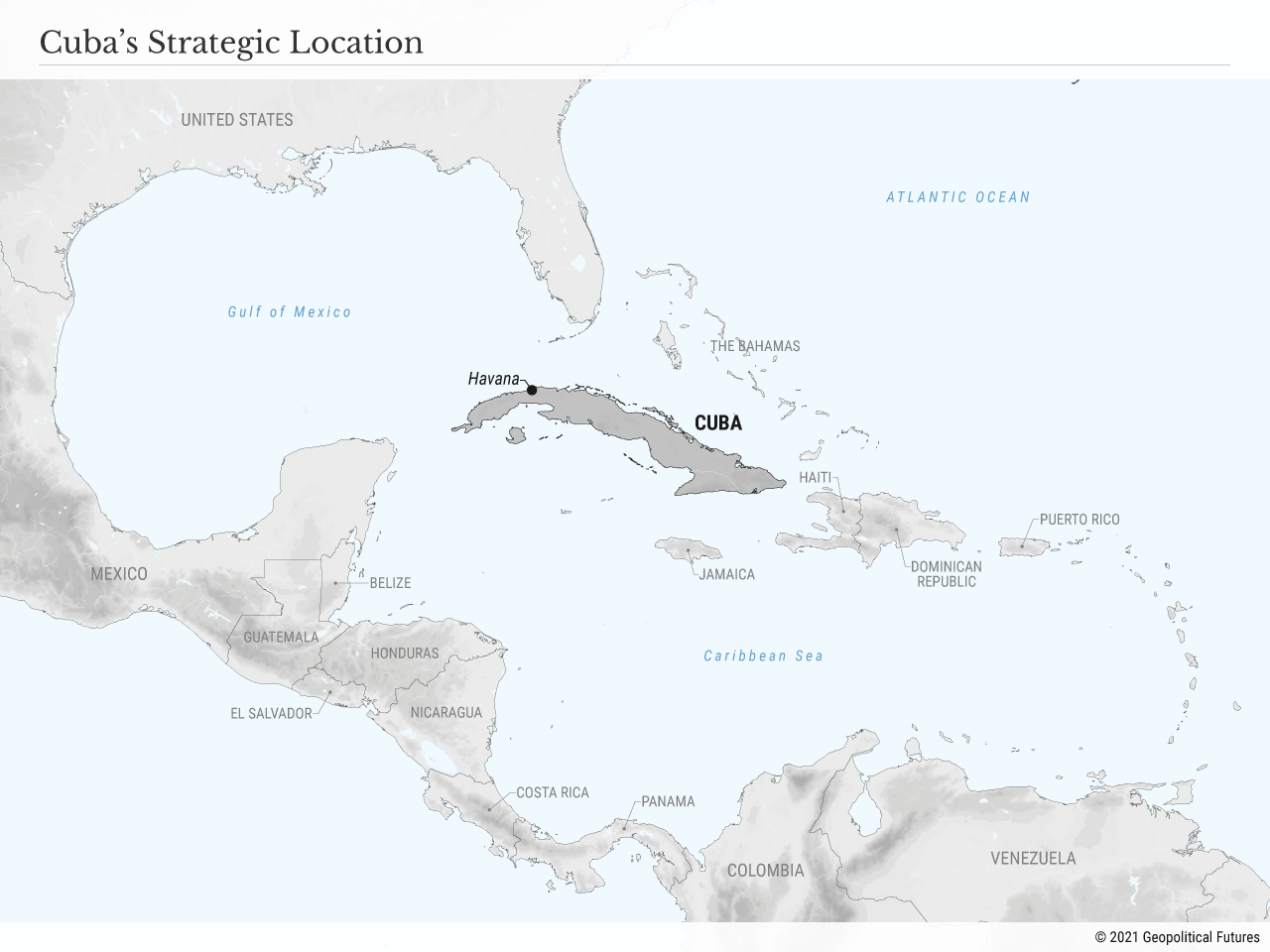By George Friedman
From a military standpoint, China is in a difficult position. It is a trading power and needs access to the global oceans. Its significant ports are on its east coast. Its fundamental fear is that the United States or another capable power will blockade those ports, rendering imports and exports impossible and severely damaging its economy. The United States has the naval and air power to interdict the ports, and it is backed by a vast coalition: Japan, South Korea, Taiwan, the Philippines, Indonesia, Singapore and Australia. Now, there is not a single organization, as there was with NATO and the Soviets, and each member of the coalition has economic relations with China and the United States, so how they would behave in a crisis is unpredictable.
Still, maritime access is fundamental for China, and the possibility of disruption alone is the country’s central problem. On matters of fundamental national interest, nothing is more frightening than uncertainty, even with the possibility of such solutions as the Belt and Road initiative. China needs certainty and has projected a self-confidence it can’t possibly have facing a world in which the U.S. is a potential adversary. Add to this the fact that while China’s gross domestic product equals almost $15 trillion, the nations it confronts have a total GDP of about $33 trillion. Note also that China has hardly any formal allies, and none in this de facto archipelago of containment. The U.S. has close relations with most and reasonable relations with all.
The Chinese threat is that it could break the archipelago either by economic pressure, which has not worked thus far, or by military attack, likely an invasion of Taiwan. But amphibious warfare is difficult in an age of anti-ship missiles and submarines. The first wave might land in Taiwan, but the essential part of amphibious warfare is logistics – the massive and continuous resupply of forces that have landed and are engaged in combat. China cannot assume that the United States and its allies would not seek to interdict the supply, nor that they would fail. Launching a failed amphibious assault would have massive negative political consequences for China in the region, and possibly for the regime at home. The problem of starting a war is that China might lose. A loss would leave China in a worse position than it was in before. The key problem, from port access to invasion of Taiwan, is that China cannot predict what the U.S. and its allies might do, and it has no levers with which to control their behavior.
The Soviet Union was in a similar position relative to the U.S. and NATO. The Soviet Union was less dependent on trade than China is, and had more experience in war. But its basic problem was that it could not control and therefore could not predict American and NATO actions. For example, the placement of American nuclear missiles in Turkey represented a threat to the Soviet homeland that it could not match. The Soviets needed to drive home their nuclear capabilities. But in the end deterrence was not enough. The Soviets had to put at risk fundamental American economic interests.
The United States is also a trading power, and two of its most important ports were and are New Orleans and Houston. They are both in the Gulf of Mexico and require access to the straits between Cuba and Key West, and Cuba and the Yucatan Peninsula. Submarines and aircraft could close both straits, and if the Soviets controlled the viability of New Orleans and Houston, they would have had a political lever with which to manage the United States. By placing nuclear weapons in Cuba, they could guarantee the inviolability of Cuba and its value as a base for controlling access to the Gulf of Mexico. This would give them significant bargaining power, not to mention parity, as the U.S. controlled the Bosporus and the Danish straits, controlling Soviet maritime movement. The Soviets did not intend nuclear war, but from Cuba they could parallel U.S. maritime strategy. The goal was parity on multiple levels. Had the U.S. not detected the nuclear deployments in time, it might have worked.
China has a similar problem to the one the Soviets had – not identical, but sufficiently similar to think through. It needs to limit U.S. actions against its maritime trade in the South and East China seas. China does not intend a major war that it could lose. It does need a lever to keep the U.S. from a set of actions China could not tolerate.
Cuba has been a challenge for the United States from the beginning, when Spain controlled it. Cuba holds the key to two vital American ports, just as the U.S. held the key to Soviet ports and now to the Chinese. The Soviet attempt to take control was to use Cuba first as a nuclear base and then as a bargaining chip over maritime access to the Gulf. Deterrence would only protect Russian assets. Interdiction would have been the key.
The Chinese do not need Cuba to maintain nuclear deterrence. They do need the means to match U.S. interdiction of Chinese ports to force the U.S. into a political understanding. They do not have the power to shatter the archipelago to their east politically or economically. The risk of war is too great. They cannot control the U.S. from their coastal waters. They need a credible threat with which to negotiate.
As we wrote Monday, Cuba’s economy is in shambles. It badly needs an economic ally. China already owns Cuba’s telecommunication system, and has been active throughout the Caribbean. The cost of shoring up Cuba is minor, and the elite in Cuba, tottering, would welcome it. When we examine the geopolitical logic, we see that China must get a lever with which to manage the U.S., and it will not find that lever in the Western Pacific. It needs a lever that threatens the U.S. as the U.S. threatens China. It must be a threat near the U.S., and one that involves maritime access to the globe. The only point from which this can be achieved without placing a major fleet off of Long Beach would be Cuba.
If the U.S. responded militarily, the cost for China would be less than failure in Asia. The U.S. might also fail to dislodge Chinese forces in Cuba, armed with anti-air and anti-ship missiles and submarines. The issue would be to prevent a U.S. preemptive strike, but while this was obvious against nuclear weapons, and accepted, the type of weapons needed for China would make preemption both more difficult and politically more complex.
This strategic option is pure speculation. I don’t know if the Chinese have thought of it or if they would regard it as too risky. I personally think that it is unlikely that they have not considered this, and I think they regard their current situation as riskier than a more radical gambit. What is clear is that the current threat to China’s ports is unacceptable to the Chinese, and engaging in amphibious warfare off their coast is even riskier. I think the Chinese want a political settlement, but in the current circumstances it would require an economic settlement that China’s economy could not stand. A Cuba move would not involve conflict unless the U.S. chose it, and the U.S. might not choose it. But it would force the U.S. into a position where action against Chinese access to the oceans would lead to a threat to U.S. access. The U.S. could attempt military action against China in Cuba, but as with Taiwan, it might fail.
From the Chinese point of view, this would create a stable solution. From the American point of view, it would hit primordial nerves and require faith that China would not in the future threaten shipping to and from New Orleans and Houston, regardless of the U.S. response. The U.S. would be accepting a massive risk it did not face before. This is difficult.
Again, I wish to emphasize I have no evidence this is China’s plan, nor do I have any evidence that this is a significant U.S. concern. I am simply speculating on how the current situation in the South China Sea might evolve. This is not a prediction, nor is it something I see on the table. But it is an intriguing possible scenario.


No comments:
Post a Comment